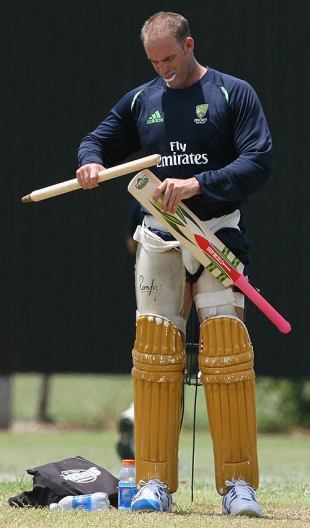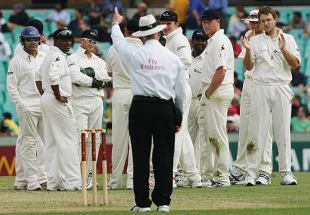Good move, bad move
The MCC's proposal to limit the power of cricket bats has merit; the ICC's decision to trial the umpiring referral system doesn't
16-May-2008
|
|

|
Albert Einstein famously never worried about the future - it arrived soon enough. A fast-arriving future, however, seems to be worrying cricket a great deal. Few weeks have shown cricket's divided consciousness about the promise of technology as clearly as the last.
First of all, the MCC, in its capacity as holder of the worldwide copyright on the Laws of Cricket, rewrote Law 6 to curb experiments aimed at making already powerful bats more powerful yet. No sooner had this been digested than the ICC, in its capacity as holder of a worldwide reputation for being unable to organise a piss-up in a brewery with Oliver Reed and Keith Moon, foreshadowed an experiment under which captains will be permitted to refer three decisions per innings to a third umpire. The MCC is probably right; the ICC is almost certainly wrong.
If you've been playing cricket in the last decade, even at low levels, you'll have noticed that bats are way more powerful than of yore. As someone who finds it psychically impossible to discard bats, and has a veritable belfry of them at home, the comparison staggers me. The bat I switched to last season is so good it almost plays the shot for me - just as well, really. When the ball hits the middle, it emits a sound as euphonious as a violin concerto. But if I hit a ball with the one I played with ten years ago, the noise is like that of fingernails on a blackboard. That improvement, if it has not already gone too far, has certainly gone far enough, and the squeals of bat-makers should be ignored.
"Tennis used to be played with wooden racquets and now it is much faster and more exciting," complained Gray-Nicolls' marketing manager. Capacity for false analogy is probably why he is in marketing: the contest in cricket is between bat and ball, not racquet and racquet. Nor is it entirely true to claim that the transition from wooden to metal racquets was an unmitigated good; you'll find plenty of tennis traditionalists who lament the obsolescence of the touch player, who was blasted out of the game by weight of stroke. And not even in tennis does "faster" translate automatically as "more exciting", or every clay court would have be been relaid with Rebound Ace.
Cricket is also a game with dense statistical records, whose integrity it has to protect. When more than a quarter of the runs in the IPL are being scored in sixes, the game's currency is being debauched by power hitting. In fact, this shows why it is wise to have the MCC as an independent law-giver. If the poobahs and MBAs in power elsewhere had their druthers, bats would soon be as wide as gates and grounds the size of tennis courts.
The MCC, for all its reputation for gin-soaked doddering, does at least have some coherent idea of cricket's greater good. If only the same could be said of the ICC, presently without a CEO, CFO, in-house counsel, and point: the decision to aim for the half-pregnancy of three referrals per innings to the third umpire is risible even by their own debased standards. As Ian Chappell put it with characteristic pith: "Following an occasionally spiteful Test series between Australia and India, where much of the controversy arose due to the umpires having reduced control on the field, the solution proposed by the ICC is to further undermine the authority of the arbiters." But given that to "stand in the way of progress" nowadays invites being thought of as a luddite or obscurantist, it may be worth turning over some of the reasons why improving the precision of decisions by technology is thought worthwhile.
There is, for instance, the old chestnut that a cricketer's career could be cruelled by an umpire's mistake. Ahem - can you remember one? Arguably, if it should transpire that a player's whole future hinges on one decision, then he has only himself to blame should it go against him. And on the whole, in fact, cricketers are far more reasonable about decisions than fans. Mike Atherton has put this most succinctly: "Life is unfair. Why should cricket be any different?"
At the same time, it is confidently asserted that the introduction of technology will eliminate room for doubt. Yet this assumption that analysis leads at all events to greater clarity is not actually a given: sometimes further analysis introduces doubt previously absent. There was an interesting example of this in the Super Test that wasn't at the SCG in October 2005, where, if you recall, umpires were empowered to refer all decisions to an upstairs VJ. The first such reference followed Matthew Hayden opting to pad up to the third ball after lunch on the first day, which pitched in line and carried on to hit the knee roll. A club umpire would have given Hayden out without hesitation; Hayden admitted later thinking he was "absolutely dead". Receiving the referral from Simon Taufel, however, Darrell Hair, brooded deeply on multiple replays, somehow located a scintilla of doubt, perhaps about the height, and allowed Hayden to carry on to a fat hundred. Asked after that game if the technology had improved the quality of the officiation, World XI captain Graeme Smith said
simply: "No."
|
|

|
An attitude has insinuated itself into cricket that umpires exist purely and simply as part of the game's machinery - as necessary, but also about as worthy of consideration as the heavy roller or the Super Sopper. This is lamentable. Umpiring involves a knowledge base and set of skills every bit as demanding as playing - in the respect that they are never off duty, even more so. Why should their thankless task be made more thankless by the possibility of public humiliation because they are not possessed of supernatural powers, because the naked eye cannot magically capture what it has just seen and replay it at slow motion?
It is fascinating that such angst should attend the possibility of a mistaken decision in a game of cricket: a glimmer of human fallibility and
we carry on like 9/11 Truthers. There was a time when we regarded cricket as a test of character, one of the challenges it posed being the manful acceptance of a decision not correct but made in good faith. At grassroots level, this is still the case. Which is why when Kumar Sangakkara accepted the fallibility of Rudi Koertzen at the Bellerive Oval last season, he grew in stature as a man as surely as his innings had enriched his standing as a player; which is why when Rahul Dravid swallowed his gall in Sydney a month later, he won many admirers. TS Eliot once wrote that "it is impossible to design a system so perfect that no one needs to be good". Yet this seems to be the ICC's aim: an arrangement under which there will never be any ground for disappointment, so that nobody need ever cope with it.
Tellingly, the people who theoretically stand to benefit most directly from this new policy are ambivalent about it. Michael Kasprowicz, who had rather more reason than most to complain of umpiring error after his misfortune at Edgbaston three years ago, commented: "It's all a part of the game. Part of the beauty of cricket was that there was room for human error and sometimes it went your way, sometimes it didn't. It all evened out in the end." Then he added, very shrewdly: "Today, with all the money invested in cricket, the shareholders are going to demand the right decision all the time. You don't pay $800 million for a cricket team to let an umpire's error ruin it for
you."
Aye, Kasper, there's the rub. For this decision concerns not the welfare of cricketers at all, and certainly not that of the game. It is primarily about money. At some stage in the future, millions of dollars might ride on the lbw decision given against the star batsman of the Mangalore Miami Vices, where the ball might have pitched an inch or two outside leg stump. This, it has been resolved, cannot possibly be left to a mere human being. But when cricket is thought too important to be left to mere humans, then it is in danger of mattering too much to be enjoyed.
Gideon Haigh is a cricket historian and writer